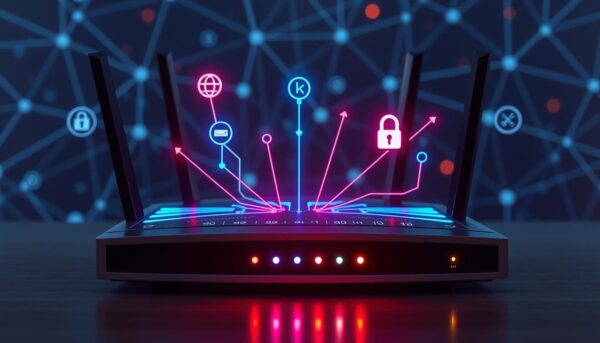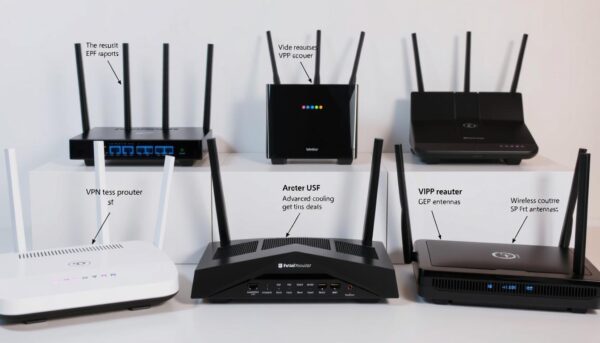✅ Last checked on
Ever thought about why protecting your whole home network is more important than just individual devices? Setting up a VPN on your router could be the answer to your security and privacy needs. Since about 75% of routers don’t support VPNs natively, finding the right option can be tough. But, a VPN setup router makes it easy by encrypting all your network traffic.
This means every device, even smart home gadgets without their own VPN, stays safe from unwanted eyes. In this guide, we’ll show you how to install a VPN on your router. We’ll also look at the many benefits it brings to your secure home network.
Key Takeaways
- Most ISP-provided routers lack VPN support, necessitating accurate compatibility checks before setup.
- VPN routers safeguard all devices, including those without native VPN capabilities.
- Choosing a reputable VPN provider is essential for optimal protection and performance.
- Steps to set up a VPN on a router include selecting a compatible service and configuring the device.
- VPN routers can significantly enhance your online privacy and security for all home-connected devices.
- Understanding your router’s compatibility and potential limitations is crucial for successful installation.
What is a VPN Router?
A VPN router lets you connect all your devices to a VPN service with one connection. It has VPN capabilities, giving an encrypted link to all devices on the network. This makes your data safe from threats.
Understanding the Basics
A VPN router sits between your internet and devices. It offers protection to all devices in your home. Even devices like smart TVs and gaming consoles can use secure internet with a VPN router.
Benefits of a VPN Router
VPN routers do more than just encrypt your internet. Here are some key benefits:
- Automatic Protection: All devices connected to your VPN router get encrypted internet access automatically.
- Convenience: You only need to log in once, making it easy for all devices.
- Compatibility: These routers work with many operating systems, including macOS, Windows, and Linux. This means all your devices can connect securely.
- Support for Non-Native Devices: Even devices like Xbox One and PlayStation 4 can use secure, anonymous internet.
- Unblocking Content: A VPN router can change your IP address. This lets you access geo-restricted apps and content.
- Simultaneous Connections: You can secure many devices at once. This is great because some VPN services limit connections.
These benefits make a VPN router a must-have for better online security and network-wide protection.
How Does a VPN Router Work?
A VPN router creates a secure link between your home network and the internet. It uses encryption protocols to do this. This ensures your online activities stay private and safe from unwanted eyes.
Encryption and Data Security
Encryption is key when using a VPN router. It makes your online data hard for hackers to get. This means your internet traffic stays safe, offering better security than regular connections.
Knowing how a VPN router works helps you see its benefits. It keeps all your data safe in one secure channel.
Connecting Multiple Devices
Another big plus of a VPN router is it can connect many devices at once. Once set up, all devices on the network get VPN protection. This includes computers, phones, smart TVs, and IoT devices.
This makes keeping your online world safe easier. You don’t have to set up each device separately. The router takes care of the secure connection, making it simpler to protect your network.

How to Identify VPN-Compatible Routers
Finding VPN-compatible routers is key to keeping your home network safe. Not every router can handle VPNs, which means you might have fewer choices for better privacy and security. Knowing how to find the right router can make a big difference.
Checking Compatibility
To see if a router works with VPNs, look in the user manual for OpenVPN or WireGuard®. You can also search online for your router model and “VPN compatibility.” Checking the router settings might show if it supports VPN clients. If your router doesn’t support VPNs, you can install DD-WRT or Tomato firmware. Or, you can buy a router that already has VPN capabilities, like AsusWRT firmware routers. Some GL.iNet routers are made to work well with VPNs.
Router Recommendations
Looking for reliable VPN-compatible routers? Here are some top picks:
| Router Model | Compatibility Features | User-Friendliness |
|---|---|---|
| Linksys WRT 3200 ACM | OpenVPN, WireGuard® | High |
| Asus RT-AC86U | VPN client support | Moderate |
| Netgear Nighthawk X10 AD7200 | Multi-device support | High |
| TP-Link Archer C7 | Third-party firmware support | Moderate |
| GL.iNet GL-AR750S | Built-in OpenVPN | Very High |
Using a VPN router makes connecting devices easier. It lets all devices on the network use the VPN service without using up all the provider’s device slots. For more tips on improving your home network and online privacy, check out the complete guide.

VPN Setup Router: Step-by-Step Guide
Setting up a VPN on your router boosts your online security. It protects all devices connected to it. Here’s a simple guide to help you set up a VPN. It covers choosing a VPN service to testing your connection.
Selecting a VPN Service
Start by picking a trustworthy VPN service that works with your router. NordVPN and Surfshark are good choices because they use strong encryption like AES 256-bit. Make sure the service you pick works with your router’s firmware. Not all routers can use VPNs, especially consumer-grade ones.
Configuring Your Router
Then, set up your router. Open the router’s settings by typing its IP address in your browser. Look for VPN settings. If you can’t find them, your router might not support VPNs.
If your router does support VPNs, upload the needed files and follow the VPN provider’s instructions. Some routers let you change their firmware to add VPN support. Picking a router that’s been supported for a while can make setup easier.
Testing Your VPN Connection
Once you’ve set everything up, test your VPN connection. Check your IP address online to see if it matches the VPN server’s location. If it does, your internet traffic is secure and safe from threats.
If you run into problems, try clearing your browser’s cache and double-check the server details. This might fix any issues you’re facing.
Pros and Cons of Using a VPN on Your Router
Using a VPN on your router has its benefits and drawbacks. Understanding these can help you decide if it’s right for you.
Advantages of a VPN Router
- Protection for All Devices: A VPN router keeps all devices on your network safe. This includes game consoles and smart appliances that don’t have VPN support.
- Convenient Security Management: Setting up VPN on your router makes managing your network easier. You can make changes and updates quickly.
- Uninterrupted Connectivity: Most VPNs let you connect up to five devices at once. A router can handle more devices without slowing down your network.
- Enhanced Privacy: A VPN hides your online activities from your ISP. This makes your browsing safer.
- Digital Safe Zone for Guests: When guests use your Wi-Fi, they’re protected by the VPN. This keeps their data safe while they’re browsing.
Potential Limitations
- Complex Configuration: Changing VPN settings on a router can be hard. It’s not easy for those who aren’t tech-savvy.
- Performance Issues: The speed of your VPN depends on your router’s performance. Slow routers might make your VPN slower too.
- Limited Scope for Individual Devices: While a router VPN covers all devices, personal devices might still need their own VPN.
- Access Restrictions: Some services, like Netflix, might block VPNs. This can make streaming hard. You might also face problems with banking and work apps.
- Potential for Incomplete Protection: Even with a VPN, some traffic might still get through. This could put your devices at risk.
Conclusion
Setting up a VPN on your router is more than just a tech upgrade. It’s a smart step to make your home network safer and more private. With VPNs like NETGEAR Armor, you can keep all your devices safe from threats like hackers and snoops. This guide shows how VPN routers help keep your online activities private from ISPs and governments.
Using a VPN on your router has its perks, like getting past geo-blocks and encrypting all your devices. But, it’s key to know the downsides, like it might be hard to set up and could slow down your internet. Knowing how important VPN routers are helps you make better choices for your internet safety, making sure your home network runs smoothly.
Choosing to use a VPN is a big step towards keeping your online life safer and more private. With the right setup and a good service, you can have a safer internet. Make sure to set up your VPN router right, so your network becomes a strong shield for all your devices against online dangers.